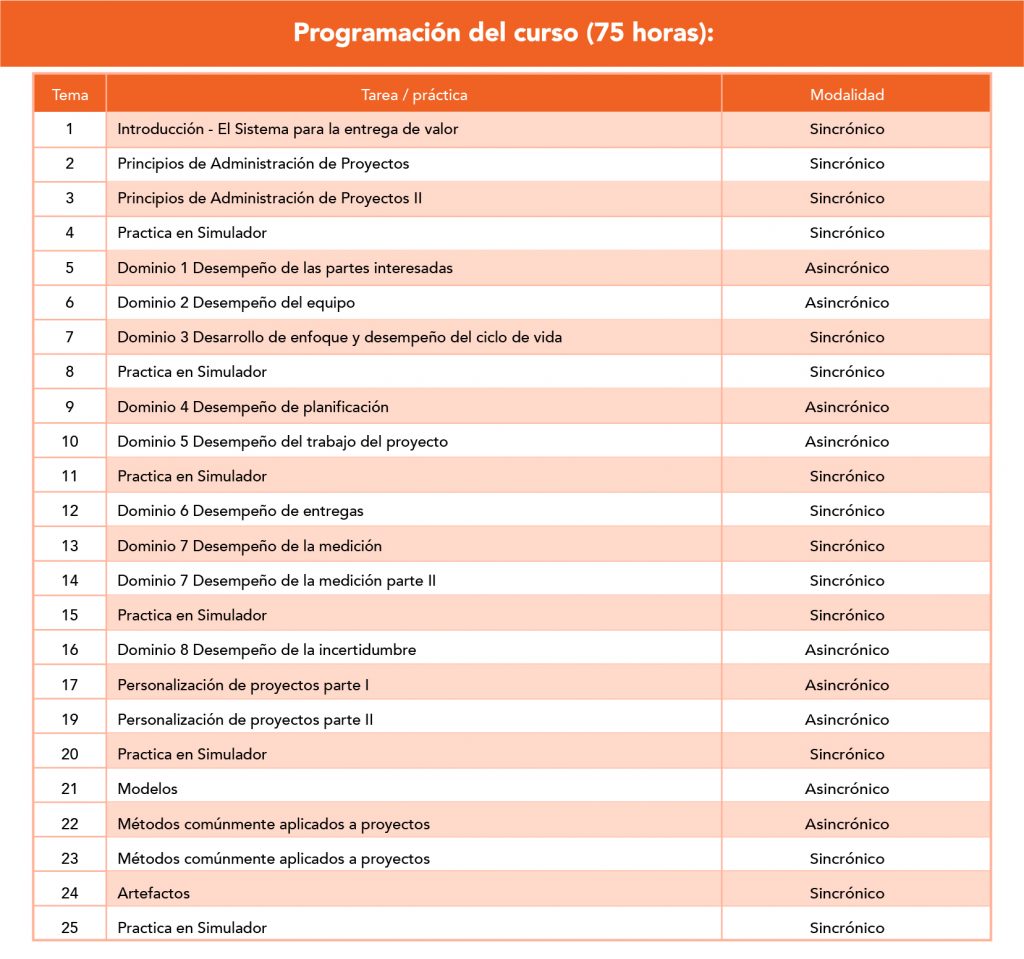
Start: 27 de noviembre 2025.


Management
DESCRIPTION:
In July 2021, the Project Management Institute of the United States published the Seventh version of the “PMBOK GUIDE”, which is the base document to certify as a “Project Management Professional PMP”, one of the most highly recognized professional certifications worldwide.
This new version had a radical change in its focus, from being a guide focused on project management processes, to a guide based on “principles”. Principles are aspects that shape the behaviors of project leaders and teams throughout the project life cycle. The classic knowledge areas that had been used until the sixth edition changed to knowledge domains, these being the terrain to demonstrate the following of the principles in their entirety.
The most interesting part of the change, from the sixth to the seventh version, is that all the changes were based on numerous and in-depth market studies worldwide where an attempt was made to identify the reality that the “PMPs” face today, the challenges, new management practices and above all the definitive incursion of “adaptive” type projects, “agile” philosophies and project customization (“tailoring”) in the daily life of any type of organization.
GOALS:
Generate the necessary knowledge and skill competencies to satisfactorily answer a PMI “PMP” certification test.
ADDRESSED TO:
Professionals who perform their duties under general supervision and are responsible for all aspects of the project during the life of the project.
Lead and direct cross-functional teams to deliver projects within schedule, budget and resource constraints
Demonstrate sufficient knowledge and experience to appropriately apply a methodology to projects that have reasonably well-defined project requirements and deliverables.
REQUIREMENTS:
- University degree of at least 4 years
- 36 months leading projects
- 35 hours of project management education
Or also:
- Secondary Baccalaureate Degree
- 60 months leading projects
- 35 hours of project management education
- In addition to the above, the participant will have to register for the exam on the PMI Website, and demonstrate the above requirements through true and complete information.
COURSE METHODOLOGY:
Virtual classes will be taught in both synchronous and asynchronous modes for each of the topics covered in the PMP Exam Content Outline, in the Project Management Body of Knowledge Guide Seventh Edition and the materials available in PMIStandarts+.
The classes will correspond to a 38% of classes in synchronous format for content that, due to its complexity or novelty, requires real-time interaction between the student and the facilitator. Another 38% will be in classes in asynchronous format, where it will be complemented not only with material developed by PXS but also with other visions from specialists in each domain of knowledge.
Finally, the course has 25% of total time performing simulated practices through an updated Simulator on the Web, which allows the student at least 3000 questions available to practice and see their performance prior to taking the PMP exam. Our simulator is of European quality, with questions that reflect the complexity of the test that the student has to take.
ASSESSMENT:
12 short tests will be carried out on our PXS E-learning platform, which constitutes more than 200 exercises of equal or greater complexity, which simulate the conditions of the real PMI exam. In total these short tests have the 75% of the note.
The other 25% is a final exam that applies all the concepts learned and that must be mastered prior to the exam.
BENEFITS:
- Digital version of the PMP BOK Guide 7th edition.
- CLOUD SIMULATOR with 3000 total questions.
- Recorded classes.
- Course truly designed as virtual through the Flipped Class Room model.
- personalized virtual tutoring with the facilitator as needed.
- One-year PMI membership with full access to materials and member discount for the certification exam.
CONTENTS:
The contents to be followed are based on the new “PMP EXAMINATION CONTENT OUTLINE” of June 2020, available on the PMP website. This PMP Exam Content Outline and the Project Management Fundamentals Guide are not the same. Knowledge must be demonstrated in three major domains:
- People.
- Process.
- Business environment.
Each question on the certification exam is based on those three domains that are transversally part of the Project Management Fundamentals Guide.
It is important to keep in mind that at least 50% of the questions refer to predictive approaches and the other half represent agile or hybrid approaches, these being:
